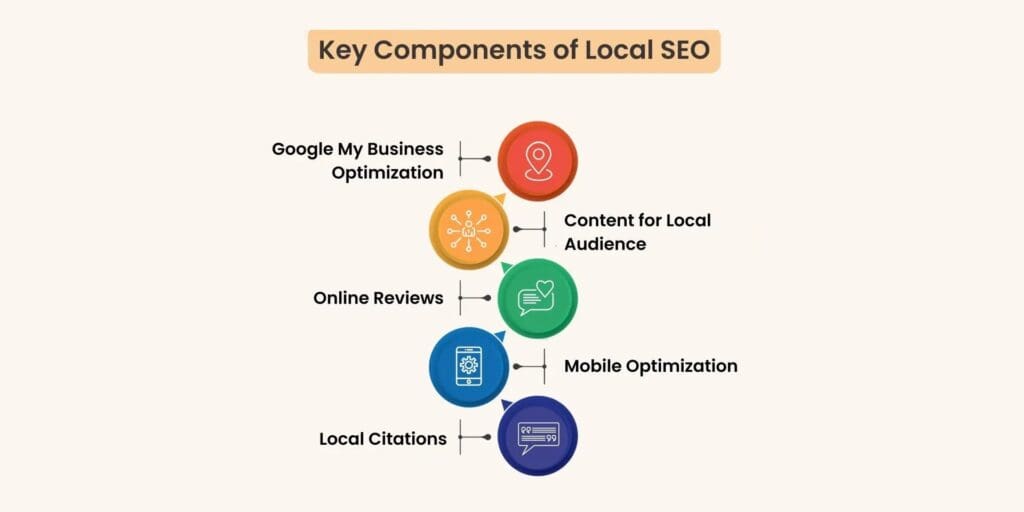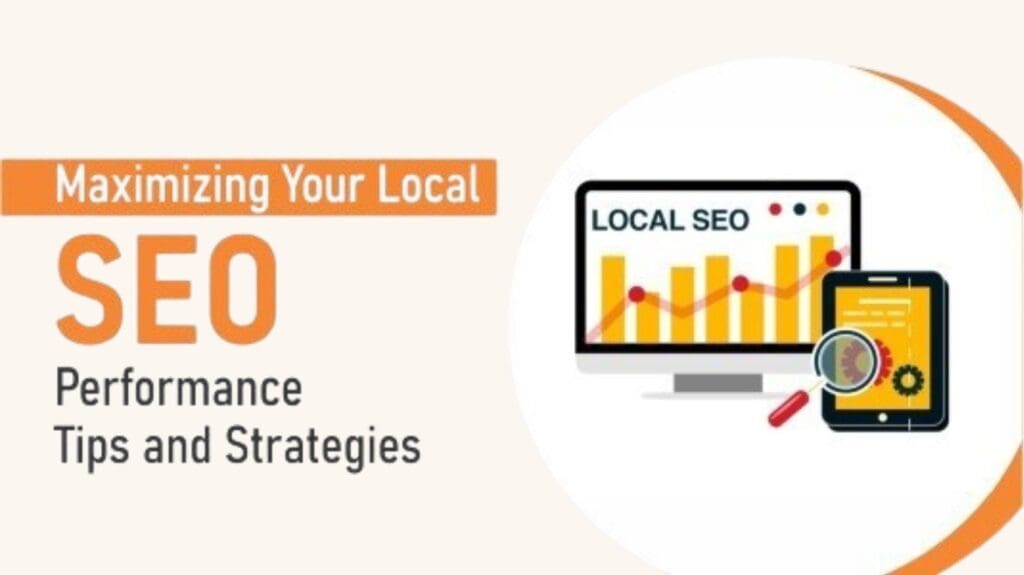In today’s digital landscape, small businesses are constantly looking for ways to stand out and attract local customers. One of the most powerful strategies they can use is local SEO, a branch of search engine optimization that focuses on enhancing visibility for businesses in specific geographic areas. Local SEO helps small businesses connect with potential customers who are nearby and looking for the products or services they offer.
In this article, we’ll explore the importance of local SEO for small business websites, how it can boost visibility and customer engagement, and actionable steps to implement a winning local SEO strategy.
What Is Local SEO?
Local SEO is the process of optimizing a website and its online presence to attract more business from relevant local searches. These searches often include terms like “near me” or specific geographic information, such as “plumber in Denver.” Local SEO helps businesses rank for these search queries, making it easier for local customers to discover them. With 46% of all Google searches having local intent, focusing on local SEO can provide a significant advantage.
Why Local SEO Matters for Small Businesses
Small businesses operate in a more localized market, making it crucial to be visible to people in their immediate area. Here are some of the main reasons why local SEO is essential for small businesses:

1. Enhanced Visibility in Local Searches
Local SEO increases the chances of appearing in Google’s Local Pack, which is the top section of search results for location-based queries. When a user searches for a service near them, the Local Pack displays the most relevant businesses alongside a map, making it easier for potential customers to see your business and contact you directly.
2. Improved Online and Offline Traffic
Local SEO doesn’t just drive website visits; it also encourages foot traffic. Many people searching locally have immediate purchasing intent. By appearing in local search results, your business can attract customers who are ready to visit your location and make a purchase, giving you both online visibility and in-store revenue.
3. Higher Conversion Rates
Unlike broader SEO strategies that target a global audience, local SEO targets people who are nearby and often ready to make a purchase. This means local searches are more likely to lead to conversions, whether it’s a call, form submission, or physical visit. Google reports that 76% of people who search for something nearby visit a business within a day, which makes local SEO a highly effective way to convert search traffic into paying customers.
4. Building Trust with Customers
Being visible in local search results and maintaining an up-to-date online presence builds trust with potential customers. A strong local SEO presence—complete with positive reviews, accurate information, and engaging content—helps establish credibility, making it more likely that people will choose your business over competitors.
5. Standing Out from Competitors
For small businesses with a lot of competition, local SEO can be a game-changer. If your competitors aren’t fully utilizing local SEO, you have an opportunity to rank higher and capture more of the local market. Even if competitors are using local SEO, a well-executed strategy can set you apart and make your business the preferred choice in your area.
Key Elements of a Successful Local SEO Strategy
To make the most of local SEO, it’s essential to implement a few core practices. Here’s a breakdown of the most effective components:

1. Google My Business Optimization
Google My Business (GMB) is a free tool that allows you to manage your online presence on Google Search and Maps. To optimize GMB, make sure your profile is complete, accurate, and engaging. This includes:
- Business name, address, and phone number (NAP)
- Business category
- Operating hours
- High-quality images of your products, services, and location
- Customer reviews and ratings
GMB is often the first point of interaction for potential customers, so optimizing it will enhance your chances of appearing in the Local Pack.
2. Local Keyword Optimization
Use keywords that reflect your services and location. Incorporate local keywords naturally throughout your website’s content, especially in:
- Page titles
- Meta descriptions
- Headings
- Body text
For example, if you’re a bakery in Austin, terms like “Austin bakery” or “bakery near downtown Austin” can help Google connect your business with local searches.
3. Consistent NAP Citations
NAP stands for Name, Address, and Phone Number. Consistency is key here; ensure that your business’s NAP information is identical across all online platforms, including your website, social media, directories, and review sites. This consistency helps Google verify your business information, improving your chances of ranking in local search results.
4. Customer Reviews and Reputation Management
Reviews play a significant role in local SEO. Encouraging satisfied customers to leave positive reviews on Google, Yelp, or other review platforms can boost your visibility and build trust with new customers. Additionally, responding to reviews—both positive and negative—demonstrates engagement and shows potential customers that you value their feedback.
5. Localized Content Creation
Creating content tailored to your local audience is an effective way to build local relevance and attract visitors. This might include:
- Blog posts on local events, news, or community activities.
- Guides or lists, such as “Top 10 Things to Do in [Your City]” or “Local Tips for [Your Service] in [Your City].”
- Case studies or customer success stories featuring local clients.
This type of content not only enhances SEO but also positions your business as an active, knowledgeable part of the community.
6. Mobile Optimization
Mobile optimization is crucial for local SEO. Many people perform local searches on their mobile devices, so ensuring that your website is mobile-friendly—loading quickly and displaying properly on all screen sizes—will improve user experience and keep visitors engaged.
Tips for Maximizing Your Local SEO Strategy
With so many moving parts, local SEO can seem overwhelming. Here are some actionable tips to help maximize your efforts:

1. Track Local SEO Performance
Use tools like Google Analytics and Google Search Console to monitor local SEO performance. Pay attention to metrics such as organic search traffic, bounce rate, and conversion rate to understand what’s working and where you can improve.
2. Leverage Local Link Building
Building links from other local businesses, directories, and websites is a great way to enhance your authority and relevance in the local market. Partner with local organizations, sponsor events, or collaborate with nearby businesses to build high-quality local backlinks.
3. Use Schema Markup for Local SEO
Schema markup is a type of microdata that helps search engines understand the content on your website. Adding local business schema to your site can improve your chances of appearing in rich results, which can boost visibility and click-through rates.
4. Optimize for Voice Search
With the rise of voice-activated devices, more people are using voice search to find local businesses. Voice searches tend to be conversational, so optimize your content with long-tail keywords and natural language that matches how people would speak when looking for services nearby.
5. Stay Active on Social Media
An active social media presence can boost local SEO by driving traffic to your website and increasing brand visibility. Share location-based content, encourage reviews, and engage with your local community through social platforms.
Conclusion: Local SEO Is Key to Small Business Success
For small businesses, local SEO is not just a nice-to-have—it’s a necessity. By focusing on local search optimization, you can make your business more visible to potential customers in your area, drive more traffic to your website and store, and build stronger connections with your community.
From optimizing your Google My Business profile to creating localized content and encouraging customer reviews, every aspect of local SEO helps you connect with your audience. Embracing these strategies will empower your business to compete effectively, grow sustainably, and become a go-to option in your community. Local SEO is more than an investment in your digital presence; it’s an investment in your business’s long-term success.

